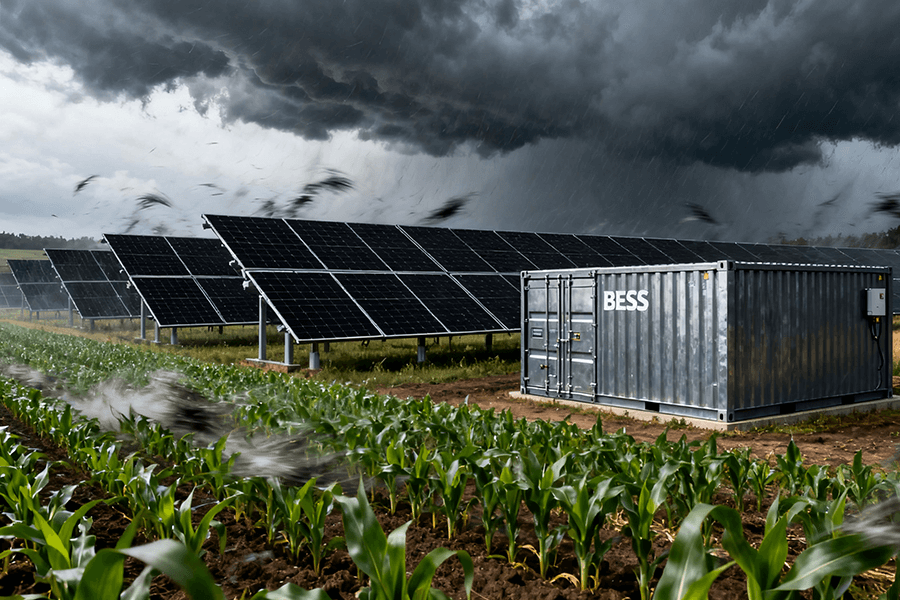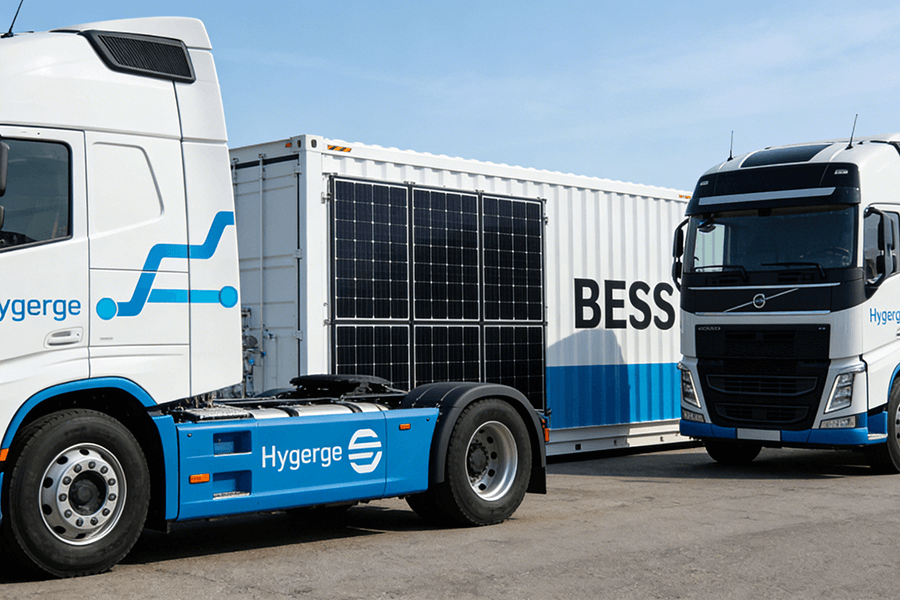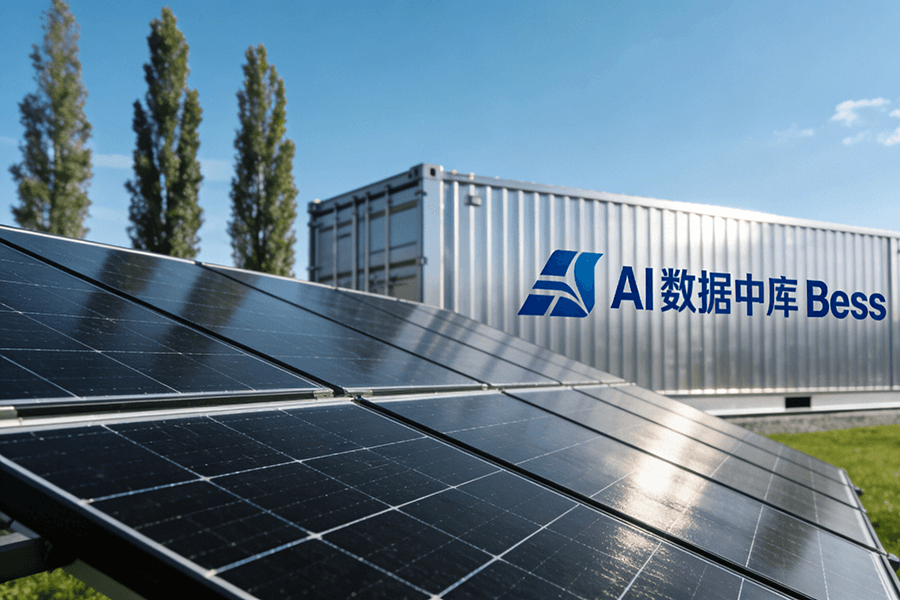
Introduction: The Climate Crisis Hitting European Farms Where It Hurts
Extreme weather isn’t just a headline—it’s a farm killer. In 2023, Europe witnessed a historic heatwave of unprecedented magnitude. Temperatures soared to a staggering 45°C (113°F) in parts of Spain and Italy, pushing the already overstretched power grids to their limits. The consequences were dire, especially for the agricultural sector:
- Southern France and Greece: These vulnerable regions suffered 30% crop yield losses. The primary culprit? Irrigation system outages at the peak of the plants’ water requirements. With no water to cool the fields or hydrate the crops, the heatwave decimated harvests [1].
- Northern Italy in 2024: A year later, the region faced a different but equally devastating challenge. Catastrophic floods submerged rural power lines, leading to a swift and severe impact on agricultural operations:
-
- Veneto Greenhouses: Within a mere 48 hours, 70% of the greenhouse operations in Veneto came to a halt.
-
- Crop Losses: The floods destroyed crops worth €200 million, including lettuce and tomato fields [2].
Why does this matter? For the EU, agricultural power security is non-negotiable. It forms the bedrock of the Farm to Fork Strategy, a comprehensive initiative with ambitious goals:
- Food Waste Reduction: Aim to cut food waste by 50% by 2030.
- Organic Production: Ensure that 25% of EU food is organically produced by the same year.
When the grid fails, farms fail—and so does Europe’s goal of self-sufficient food supply. This is where BESS containers step in as the game-changers. Compact, weatherproof, and scalable, these energy storage solutions are the unsung heroes that can turn “climate disaster” into “business as usual” for forward-thinking farmers.
BESS Containers in Action: Saving Farms During Extreme Events
BESS doesn’t just “back up” power—it prevents disruptions. Below are two high-stakes scenarios where BESS proved irreplaceable, illustrating how these energy storage solutions act as a lifeline for European agriculture in the face of climate-induced challenges.
Heatwave Irrigation: Keeping Crops Hydrated When the Grid Crashes
Heatwaves have become an increasingly frequent and severe weather phenomenon in Europe, causing a sharp spike in electricity demand as millions of air conditioning units hum to keep people cool. In response, utilities are often forced to impose rolling blackouts to prevent grid collapse. For agricultural operations, these power outages can spell disaster, particularly when it comes to maintaining crop hydration. Enter BESS, a game-changer in safeguarding farms against the ravages of extreme heat.
Case Study: Spanish Olive Farm (Andalusia, 2023)
In the sun-baked region of Andalusia, a 500-hectare olive farm faced a daunting challenge during the sweltering summer of 2023. Recognizing the threat posed by heatwaves to their operations, the farm management made a strategic investment in energy resilience by pairing a 500kW solar array with a 1MWh Maxbo Solar BESS container.
This decision paid off handsomely when the region was hit by a series of heatwaves, triggering 12 separate grid failures, each lasting between 4 to 8 hours. During these outages, the BESS system automatically sprang into action, seamlessly powering the farm’s drip irrigation systems. By ensuring a consistent water supply to the olive trees, the farm was able to avoid the catastrophic crop losses experienced by many of its neighbors.
While the regional average crop loss due to heatwave-induced outages was a staggering 60%, this forward-thinking farm managed to save 80% of its olive crop. This translated to an impressive €1.8 million in avoided losses [3]. The success of the BESS solution can be attributed to its ability to store excess solar energy generated during the day, when production peaks, and release it precisely when needed during grid outages. This not only eliminated the farm’s reliance on fossil fuel generators, which often struggle to operate in extreme heat, but also provided a sustainable and cost-effective energy solution.
Flood & Storm Recovery: Powering Critical Systems Post-Disaster
Floods and storms pose another significant threat to agricultural operations, often causing extensive damage to grid infrastructure and leaving farms without power for weeks. However, BESS containers, designed to withstand harsh environmental conditions, offer a reliable source of backup power that can keep essential farm systems running during the recovery period.
Case Study: Belgian Vegetable Farm (Flanders, 2024)
In the fertile fields of Flanders, a 200-hectare vegetable farm found itself in the eye of the storm—literally—when a Category 2 storm swept through the region, knocking out power to 30,000 rural households. With the grid down and repairs underway, the farm’s 2MWh BESS container stepped up to the plate, powering a range of critical systems:
- Livestock ventilation: By keeping the air circulating in the barns, the BESS prevented 500 dairy cows from overheating, safeguarding the health and productivity of the herd.
- Water pumps: With floodwaters threatening to drown the root crops, the BESS-powered water pumps worked overtime to keep the fields drained, protecting the valuable harvest.
- Greenhouse HVAC systems: Maintaining a stable temperature of 22°C in the greenhouses was crucial for the survival of the bell pepper seedlings. The BESS ensured that the HVAC systems continued to operate, providing the ideal growing conditions for the young plants.
Thanks to the reliable power supply provided by the BESS, the farm was able to avoid significant losses and fulfill 90% of its supermarket orders on time [4]. This not only protected the farm’s bottom line but also ensured a steady supply of fresh produce to consumers during a challenging time.
Proactive Resilience: Designing BESS for Europe’s Wild Weather
The best BESS isn’t just powerful—it’s climate-adapted. In the face of Europe’s ever-changing environmental challenges, manufacturers such as Maxbo Solar are leading the charge. They engineer containers that are not only built to endure Europe’s most extreme conditions but also incorporate predictive technologies. These technologies work in tandem to ensure that the BESS is fully charged and ready for action precisely when disaster strikes, safeguarding agricultural operations from power outages.
Climate-Adapted BESS Design: Built to Withstand the Elements
A one-size-fits-all approach to Battery Energy Storage Systems (BESS) simply doesn’t cut it in Europe’s diverse climates. From the low-lying, flood-prone regions of the Netherlands to the sun-baked fields of Spain and the storm-battered coasts of the UK, each area presents unique environmental challenges. To address this, BESS containers are carefully customized to meet the specific needs of different regions, as illustrated in the table below:
| Climate Risk | BESS Design Feature | Real-World Example |
|---|---|---|
| Flooding (e.g., Netherlands, Italy) | IP67 Waterproof Enclosures These enclosures are hermetically sealed, providing protection against immersion in up to 1 meter of water for 30 minutes. This ensures that the internal components remain dry and functional even during severe flooding events. | In 2024, a Dutch flower farm’s BESS, equipped with IP67 waterproof enclosures, faced the devastating Rhine floods head-on. Miraculously, it emerged unscathed, with zero internal damage, continuing to supply uninterrupted power to the farm’s critical operations. |
| Extreme Heat (e.g., Spain, Greece) | Heat-Resistant Lithium-Ion Batteries Designed to operate safely at temperatures of up to 50°C, these batteries are complemented by an advanced active cooling system. This combination prevents overheating and maintains optimal performance even in the most sweltering conditions. | During the intense 45°C heatwaves of 2023, a Spanish almond farm’s BESS, featuring heat-resistant batteries and active cooling, maintained its full capacity throughout. This enabled the farm to keep its irrigation and processing equipment running smoothly, avoiding significant crop losses. |
| Storms (e.g., UK, Belgium) | Wind-Resistant Mounting Rated to withstand winds of up to 180 km/h, these mountings provide a stable foundation for the BESS. Paired with impact-resistant panels, they offer robust protection against flying debris and strong gusts. | In 2023, a BESS installed on a Greek coastal farm in the Cyclades Islands endured the wrath of Hurricane Ianos. While three nearby diesel generators were destroyed by the storm’s fury, the BESS remained intact, continuing to power the farm’s essential functions. |
Predictive Charging: BESS That “Knows” a Storm Is Coming
Modern BESS systems are at the forefront of technological innovation, integrating seamlessly with sophisticated EU weather forecasting systems, such as the European Centre for Medium-Range Weather Forecasts (ECMWF). This integration allows BESS to anticipate extreme weather events and initiate pre-charging procedures in advance, effectively “future-proofing” the energy supply. By ensuring that the BESS has a full charge when power outages are likely to occur, agricultural operations can continue running smoothly, minimizing disruptions and potential losses.
Case Study: German Greenhouse Operation (Bavaria, 2023)
A 10-hectare tomato greenhouse in Bavaria, Germany, serves as a prime example of the effectiveness of predictive charging. The greenhouse operator linked their 1.5 MWh BESS to ECMWF alerts, enabling the system to receive real-time weather forecasts and warnings. Throughout 2023, the BESS pre-charged 15 times in anticipation of various extreme weather events, including heatwaves, thunderstorms, and even a late frost.
The results were remarkable. Thanks to the predictive charging capabilities of the BESS, the greenhouse experienced zero disruptions to its irrigation and climate control systems. In contrast, neighboring greenhouses without BESS technology suffered a significant 40% yield loss due to power outages during these extreme weather events. This case study clearly demonstrates how BESS, with its climate-adapted design and predictive charging features, can be a game-changer for European agriculture, providing reliable and resilient power solutions in the face of climate challenges.
The Numbers Don’t Lie: Economic & Food Security Benefits
BESS isn’t a “nice-to-have”—it’s a profit protector. The data below shows why European farms are making substantial investments, demonstrating how this technology acts as a safeguard against financial risks and operational disruptions caused by climate-related challenges.
Minimizing Agricultural Losses: Every Euro in BESS Saves €3 in Losses
A 2024 European Commission (EC) study revealed a compelling economic case for Battery Energy Storage Systems (BESS) in agriculture. Farms equipped with BESS witnessed a remarkable 50–70% reduction in extreme weather-related losses compared to their non-equipped counterparts [7]. This advantage is even more pronounced for high-value crops, where the potential for financial devastation during climate events is significant.
The table below highlights real-world examples from 2023, showcasing the dramatic difference BESS can make:
These numbers underscore the crucial role BESS plays in preserving agricultural investments. For instance, the Dutch tulip farm was able to avoid a complete loss of its crop during the heatwave, thanks to the consistent power supply provided by BESS. Similarly, the French vineyard mitigated significant losses from grape rot, and the Polish livestock farm minimized animal fatalities during the flood.
Safeguarding EU Food Security: Stable Supply = Stable Prices
The impact of BESS extends beyond individual farm profitability—it is a linchpin for maintaining EU food security. When BESS enables farms to remain productive during extreme weather events, it helps prevent food shortages and the subsequent price spikes.
Case Studies:
- Germany: In the aftermath of the 2023 heatwave, lettuce prices in Germany soared by 60%. This increase was primarily due to supply gaps from non-BESS farms that were unable to maintain production during the adverse weather conditions.
- Spain: Conversely, BESS-equipped farms in Spain were able to sustain lettuce production, ensuring a steady supply to the market. As a result, EU supermarkets experienced stable lettuce prices, demonstrating the stabilizing effect of BESS on food supply chains.
The European Commission projects that widespread adoption of BESS could reduce EU food price volatility by 25% by 2030 [7]. This would not only benefit consumers by ensuring affordable access to staple crops but also contribute to the overall resilience of the European agricultural sector in the face of climate change. By maintaining consistent production levels, BESS helps safeguard the food supply and mitigate the economic impacts of climate-related disruptions.
Policy & Incentives: The EU Is Paying Farmers to Adopt BESS
Farmers don’t have to face the challenges of securing reliable energy storage alone. Recognizing the pivotal role of Battery Energy Storage Systems (BESS) in enhancing agricultural resilience, the EU and national governments have established a comprehensive framework of subsidies and incentives. These initiatives are meticulously designed to alleviate the financial strain on farmers, making BESS adoption not only more accessible but also a sustainable long – term investment.
EU Grants: Up to 80% of BESS Costs Covered
The European Union has launched a series of targeted grant programs aimed at facilitating the integration of BESS in the agricultural sector, offering substantial financial relief to farmers across Europe.
| Grant Program | Eligibility Criteria | Cost Coverage | Impact Example |
|---|---|---|---|
| Farm to Fork Resilience Fund | Farms spanning less than 100 hectares seeking climate – adapted energy storage solutions | 60–80% of BESS – related costs | In 2024, 1,200 Spanish farms utilized this fund to install BESS, significantly bolstering their energy security and resilience against climate – induced power disruptions. [10] |
| European Union Solidarity Fund (EUSF) | Regions declared as “disaster zones” by the EU | 100% of BESS deployment costs | Following the severe floods in Italy in 2024, the EUSF allocated €50 million. This enabled 300 farms to install BESS, ensuring they could rapidly rebuild and fortify their energy infrastructure, safeguarding future operations from similar disruptions. [11] |
Insurance Discounts: BESS = Cheaper Premiums
Insurance companies have actively joined the push to promote BESS adoption, recognizing its efficacy in risk mitigation and loss reduction. By providing attractive discount schemes, they create a win – win scenario, incentivizing farmers to invest in energy storage solutions while reducing their own exposure to potential claims.
- Groupama, France: As France’s preeminent agricultural insurer, Groupama offers a persuasive incentive for farms outfitted with BESS – based emergency power systems. These farms are eligible for a substantial 25% reduction in insurance premiums, a direct reflection of the decreased risk of power outages and associated damages. For example, a dairy farm in Normandy installed a 1MWh BESS and realized annual savings of €3,200 on its insurance premiums, a considerable financial benefit that enhances the overall cost – effectiveness of BESS adoption. [12]
- Allianz AG, Germany: In Germany, Allianz AG has acknowledged the significant value of BESS in enhancing the resilience of greenhouses. The company has implemented an 18% premium reduction for greenhouses equipped with BESS, basing this decision on a remarkable 40% decrease in claim frequency. This strategic move not only encourages broader BESS adoption among farmers but also serves as a clear demonstration of the practical impact of energy storage on effective risk management within the agricultural sector. [13]
Maxbo Solar: Your Partner in Agricultural BESS Resilience
At Maxbo Solar (www.maxbo-solar.com), we don’t just sell BESS—we design European-specific solutions that turn climate challenges into opportunities. As a leader in renewable energy storage, we’ve equipped over 500 European farms (2020–2025) with BESS containers tailored to their unique needs.
Here’s how we stand out:
- Climate-Customized Designs: Our BESS containers come with IP67 waterproofing (for floods), hurricane-rated frames (for storms), and heat-dissipating panels (for heatwaves)—tested to EU standards (EN 62133, IEC 61427).
- Predictive Charging Integration: We link every BESS to ECMWF and national weather services, so your system pre-charges 24–48 hours before extreme events—no manual input needed.
- End-to-End Support: From site assessment (we analyze your farm’s power usage and climate risks) to installation (completed in 3–5 days) and 24/7 monitoring (via our Maxbo App), we’re with you every step.
Case Study: Maxbo Solar x Greek Olive Farm (Crete, 2024)
A Crete-based olive farm faced annual heatwave outages and storm damage. We installed a 1.2MWh BESS container with:
- Wind-resistant mounting (rated for 200km/h winds)
- Heat-resistant batteries (operational up to 50°C)
- Predictive charging linked to Greek weather alerts
In 2024, the farm survived 8 heatwave outages and 1 major storm—saving 90% of its olive crop and €2.1 million in losses.
Visit www.maxbo-solar.com today to request a free farm resilience assessment. Let’s keep your crops growing—no matter the weather.






